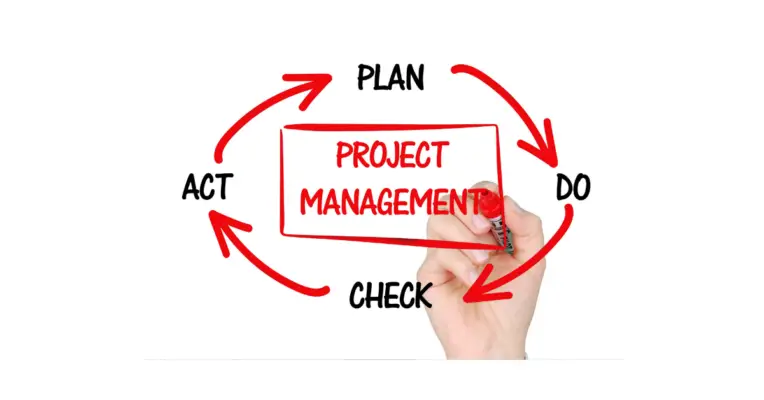Project managers manage project budgets and ensure that projects are within the allocated budget.
They oversee the financial aspects of projects, including estimating costs, tracking project expenses, and adjusting the budget as needed.
Project managers also play a crucial role in risk management, identifying potential risks and developing mitigation plans.
They are responsible for monitoring project progress, identifying any delays or issues, and implementing corrective actions to keep the project on track.
Additionally, project managers are responsible for leading project teams, providing guidance and support to team members, and ensuring effective communication and collaboration throughout the project lifecycle.
This article aims to provide a concise overview of the project manager job description in PDF format.
The article will define the role of a project manager, list the necessary qualifications, outline the responsibilities associated with the position, and discuss the working conditions typically experienced by project managers.
Definition of Project Manager
The job description of a project manager typically includes responsibilities such as planning, organizing, and managing projects to ensure their successful completion.
Additionally, project managers are expected to oversee project teams, allocate resources, and monitor progress to ensure adherence to project goals and objectives.
In project management, a detailed project plan is crucial for the successful execution of projects.
It outlines the tasks, timelines, and resources required to complete the project. This plan also identifies potential risks and provides strategies to mitigate them.
Project risks are uncertainties that may impact the project’s objectives.
These risks can be related to budget constraints, technical challenges, or external factors such as regulation changes or market conditions.
The project manager’s role is to identify, assess, and manage these risks throughout the project lifecycle.
Budget constraints are a common challenge in project management. The project manager must carefully allocate resources and ensure the project stays within the approved budget.
This involves tracking expenses, managing costs, and making adjustments when necessary.
The role of a project manager is to oversee the planning, execution, and completion of projects.
They are responsible for coordinating project resources, managing stakeholders, and meeting project deliverables.
The project manager is also responsible for communication, risk management, and problem-solving.
Execution of projects involves implementing the project plan and carrying out the tasks required to achieve the project’s objectives.
This includes coordinating team members, monitoring progress, and making necessary adjustments.
Effective project execution requires strong leadership, communication, and coordination skills.
Project resources include people, equipment, materials, and technology required to complete the project.
The project manager must ensure that these resources are allocated effectively and available when needed.

Project stakeholders are individuals or groups who are interested in or are affected by the project.
They may include project sponsors, clients, team members, and external parties. The project manager must engage and communicate with stakeholders to meet their needs and manage expectations.
Actual project refers to the implementation and execution of the project plan. It involves the actual work being done to achieve the project’s objectives.
The Association of Project Management is a professional body that promotes project management excellence.
It provides resources, certifications, and networking opportunities for project management professionals.
An author in project management refers to someone who has written articles, books, or other publications.
They contribute to the knowledge and understanding of project management principles, practices, and techniques.
Closing projects involves completing all project activities, documenting lessons learned, and transitioning deliverables to the client or end-users.
This phase ensures that all project objectives have been met and formally closed.
Overview of Project Management
Complex projects are characterized by their size, scope, and level of uncertainty. They often involve multiple stakeholders and interdependent tasks and require extensive planning and coordination.
Comprehensive project documentation includes all the documentation related to the project, such as the project plan, requirements, design documents, and change requests.
This documentation helps to ensure that the project is well-documented and can be understood by stakeholders.
Day project management refers to the daily activities and tasks involved in managing a project.
It includes monitoring progress, communicating with stakeholders, and making decisions.
Effective project management involves achieving project objectives within time, budget, and quality constraints.
It requires strong leadership, communication, and problem-solving skills.
Efficient project managers can optimize resources, streamline processes, and achieve project objectives most effectively and efficiently.
Enhancement projects refer to projects that aim to improve or enhance existing products, processes, or systems.
They often involve identifying areas for improvement, developing and implementing solutions, and measuring the impact of the enhancements.
Excellent project management is characterized by successful project delivery, effective communication, stakeholder satisfaction, and the ability to manage risks and challenges.
Experience in project principles refers to having a deep understanding and practical knowledge of project management principles, methodologies, and best practices.
Project factors can include various aspects such as the project’s objectives, scope, resources, stakeholders, and risks.
These factors must be carefully considered and managed throughout the project lifecycle.
High-impact project initiatives have significant strategic or financial implications for an organization.
They often require extensive planning, coordination, and resources to achieve their objectives.
Huge project sizes refer to large-scale, scope, or complex projects. These projects often involve multiple teams and stakeholders and require extensive planning and coordination.
An ideal project manager possesses technical, leadership, and interpersonal skills.
They have a strong understanding of project management principles and can lead and manage teams effectively.
Individual projects refer to specific projects that are separate and distinct from other projects within an organization.
Each individual project has its own objectives, resources, and stakeholders.
Integration between project activities refers to coordinating and aligning various project tasks and activities.
This ensures that all project activities work together towards the project’s objectives.
Key client projects are projects that are of strategic importance to a client or customer.
These projects often have high visibility and require close collaboration between the project team and the client.
Key project artifacts refer to a project’s essential documents, deliverables, and outputs.
These artifacts may include project plans, requirements, design documents, and test results.
Management of projects involves planning, organizing, and controlling project activities to achieve the project’s objectives.
It includes defining project scope, allocating resources, and monitoring progress.
Measuring project performance involves tracking and evaluating the progress and success of a project. This can be done through various metrics, such as cost performance, schedule performance, and quality performance.
MSc Project Management refers to a Master of Science degree in Project Management.
This degree program provides students with advanced knowledge and skills in project management principles and practices.
The nature of projects refers to their unique characteristics and attributes that distinguish them from ongoing operations.
Projects are temporary endeavors with specific objectives, timelines, and resources.
Preparing project estimates involves determining the costs, time, and resources required to complete a project.
This often involves analyzing project requirements, conducting research, and making informed estimations.
Price project budgets refer to the financial plans and allocations for a project. These budgets include the estimated labor, materials, equipment, and other costs.
The priority of a project manager is to ensure the successful delivery of the project’s objectives.
They lead and manage the project team, coordinate resources, and manage risks and issues.
A project administrator is responsible for providing administrative support to the project manager and team. They assist with tasks such as scheduling, document management, and communication.
Project champions advocate for and support a project within an organization.
They play a critical role in securing resources, gaining buy-in from stakeholders, and overcoming barriers to project success.
Project cost refers to the total expenses incurred during the execution of a project. This includes the cost of labor.
Project Planning
The efficient planning and execution of projects is essential for achieving successful outcomes.
This requires project managers to possess a range of skills and expertise. Some crucial skills for project managers include strong organizational skills, effective communication and presentation skills, and the ability to multitask and manage resources effectively.
Conflict resolution and negotiation skills are also important for addressing any issues or challenges during the project.
Additionally, project managers should have a background in business skills and financial analysis to ensure the project aligns with the organization’s strategy and goals.
In the current times, project management excellence is highly valued by organizations as it contributes to the successful completion of projects and the achievement of desired outcomes.
Efficient planning, solid organization skills, and financial analysis are crucial in ensuring that projects are completed within limited time and resources.
Project managers play a vital role as the go-to person for ideas, problem-solving, and managing the various aspects of the project.
They need to understand people and their needs well and be able to lead and motivate the project team effectively.
In African companies, project management is becoming increasingly important in driving company profits and delivering value to stakeholders.
The primary responsibility of project managers in this context is to ensure that key issues are addressed and projects are completed successfully.
This requires a comprehensive understanding of project principles, effective management of resources, and strong leadership skills.
Project managers must also prioritize the needs and expectations of stakeholders to ensure their satisfaction.
Project management is a critical discipline that involves detailed project planning, effective execution, and efficient resource management.
Project managers are key in overseeing projects, managing risks, and delivering successful outcomes.
They must possess various skills, from technical expertise to strong leadership and communication abilities.
Overview of Job Description
An overview of the job description for a project manager can be found in the accompanying PDF document.
The job description of a project manager entails a range of responsibilities. They are responsible for defining the project scope, ensuring it is delivered within the allocated time and budget, and managing the people and tasks involved.
Project managers must possess various skills, including strong leadership abilities, excellent communication skills, and the ability to delegate tasks effectively.
They need to have a thorough understanding of the project scope and be able to develop a comprehensive project schedule.
Additionally, project managers are responsible for monitoring the project’s progress, identifying and resolving any issues, and ensuring the project is delivered successfully.
Qualifications
The qualifications for a project manager encompass various aspects, including education requirements, professional certifications, licenses, and skills and knowledge requirements.
Education requirements typically involve a bachelor’s degree in a relevant field, such as business administration or project management.
Additionally, professional certifications and licenses, such as the Project Management Professional (PMP) certification, are often sought after by employers to demonstrate expertise in project management.
Skills and knowledge requirements may include proficiency in project management software, strong leadership and communication skills, and a solid understanding of project management methodologies and best practices.

Education Requirements
To meet the education requirements for a project manager position, candidates typically need to hold at least a bachelor’s degree in a relevant field, such as business administration, engineering, or information technology.
This educational background provides individuals with the necessary knowledge and skills to carry out the responsibilities of a project manager effectively.
Additionally, certification preparation steps are available for those who wish to enhance their project management expertise further.
These certifications validate the individual’s understanding of project management principles and techniques, making them more competitive in the job market.
As a project manager, it is crucial to have a solid understanding of project planning, documentation, and resource management.
This ensures that the project team is properly guided and that the project is completed within the specified time frame and budget.
Professional Certifications & Licenses
Certifications and licenses in project management validate an individual’s expertise in applying project management principles and techniques, demonstrating their competence in the field.
These professional certifications and licenses are often required or preferred for a project manager.
In a project manager’s job description, the duties and responsibilities typically include overseeing and managing all aspects of a project, from initiation to completion.
This involves utilizing management techniques such as knowledge management, project leadership, communication skills, and risk management.
Professional certifications and licenses in project management assure employers that the individual possesses the necessary skills and knowledge to manage projects effectively.
These certifications also demonstrate a commitment to professional development and staying current in the field, making the project manager a valuable asset in any organization.
Skills & Knowledge Requirements
Skills and knowledge requirements for project management professionals encompass a range of competencies necessary for effectively overseeing and executing projects.
Project managers play a crucial role in companies and organizations by ensuring the successful completion of projects within the specified constraints of time, budget, and quality.
To achieve this, project managers need to possess a detailed understanding of project requirements and be capable of creating and implementing a comprehensive project plan.
Effective communication skills are essential for coordinating with team members, stakeholders, and clients throughout the project lifecycle.
Additionally, project managers should utilize various project management techniques to monitor progress, identify and address potential risks, and make necessary adjustments to ensure project success.
The role of a project manager requires a combination of technical expertise, leadership skills, and the ability to adapt to changing circumstances.
Responsibilities
- Strategic planning and execution: This involves developing a clear vision and goals for the project and implementing strategies to achieve them.
- Resource management and allocation: This responsibility ensures that the necessary personnel, equipment, and materials are available for the successful completion of the project.
- Risk assessment and mitigation strategies: This responsibility aims to identify potential risks and develop measures to minimize their impact on the project.
- Project documentation and reporting involves documenting project progress, milestones, and outcomes and communicating this information to stakeholders.
- Communication with stakeholders: Effective communication ensures that their needs and expectations are understood and addressed throughout the project lifecycle.
Strategic Planning & Execution
Strategic planning and execution within the context of a project manager’s role involves developing and implementing a cohesive and comprehensive plan to achieve project objectives.
A project manager’s job description includes various duties and responsibilities that require a combination of leadership, organizational, managerial, and problem-solving skills.
Regarding strategic planning, project managers are responsible for identifying project goals, objectives, and deliverables and determining the necessary resources, timelines, and budget.
They must also develop strategies to mitigate potential risks and ensure project success.
Execution involves overseeing and coordinating project activities, monitoring progress, and making adjustments as necessary.
Project managers must communicate effectively with team members, stakeholders, and clients, ensuring everyone is aligned and informed throughout the project lifecycle.
They must also possess strong problem-solving skills to address any issues or obstacles during the execution phase.
Strategic planning and execution are critical components of a project manager’s role, requiring a combination of skills and expertise to deliver projects successfully.
Resource Management & Allocation
Resource management and allocation involves identifying and allocating necessary resources, such as personnel, equipment, and materials, to support the successful execution of a project.
The role of a project manager in resource management and allocation is crucial as they are responsible for ensuring that the right resources are available at the right time and in the right quantities.
This requires effective planning, coordination, and monitoring of resources throughout the project lifecycle.
A project manager’s job description often includes assessing resource requirements, developing resource plans, assigning resources to tasks, and tracking resource utilization.
The table below highlights the key aspects of resource management and allocation in project management:
| Aspects of Resource Management and Allocation | Description |
|---|---|
| Resource Assessment | Identifying and evaluating resource requirements for the project. |
| Resource Planning | Developing a plan to allocate resources effectively. |
| Resource Assignment | Assigning specific resources to tasks based on their skills and availability. |
| Resource Monitoring | Tracking resource utilization and making adjustments as needed. |
Risk Assessment & Mitigation Strategies
Risk assessment and mitigation strategies are crucial aspects of project management.
Identifying and managing potential risks is essential to ensure project goals are achieved and stakeholders’ expectations are met.
A risk assessment involves identifying potential risks that could impact the project delivery and evaluating their likelihood and potential impact.
This process enables project managers to prioritize risks and develop effective strategies to mitigate their effects.
Mitigation strategies can include contingency planning, risk transfer, risk avoidance, and risk acceptance.
Project managers can minimize the likelihood and impact of project failures by implementing these strategies.
Effective risk assessment and mitigation strategies enhance project success and contribute to project management’s overall effectiveness.
Key points to emphasize:
- Risk assessment involves identifying and evaluating potential risks.
- Mitigation strategies include contingency planning, risk transfer, risk avoidance, and risk acceptance.
Project Documentation & Reporting
Documentation and reporting are crucial in capturing and communicating project-related information to stakeholders.
In the context of a project manager’s job description, project documentation involves recording all the necessary details, such as project objectives, scope, deliverables, and timelines.
This documentation ensures that all project activities are tracked and documented accurately.
Conversely, reporting involves regularly providing updates and progress reports to stakeholders, including project sponsors, team members, and clients.
This step allows for effective communication and transparency throughout the project lifecycle.
Applying project management principles requires the professional project manager to adhere to specific project documentation and reporting steps.
The project manager facilitates effective communication and successful project completion by ensuring well-documented and regular sharing of project information.
Communication with Stakeholders
Effective communication with stakeholders is essential for project success as it ensures that all parties involved share and understand relevant information.
This communication encompasses internal and external stakeholders, including project team members, clients, suppliers, and other key individuals or organizations.
The project manager plays a crucial role in facilitating this communication and ensuring that all stakeholders are informed about project updates, progress, and any changes that may impact the project’s success.
To emphasize the importance of effective communication with stakeholders, the following points should be considered:
- Communication about project updates:
- Regularly informing stakeholders about project progress and any changes that may arise.
- Providing updates on milestones achieved, risks identified, and mitigation strategies implemented.
- Communication within project teams:
- Encouraging open and transparent communication among team members.
- Facilitating effective collaboration and information sharing to ensure project deliverables are met.
Project managers can improve project deliverables, stakeholder relationships, and organizational alignment by prioritizing effective communication.
Furthermore, it enables monitoring tools for performance monitoring and financial analysis, ensuring that the project remains on track and meets its objectives.
Effective communication with stakeholders is considered a critical skill for successful project delivery in the project management industry.

Working Conditions
The working conditions of a project manager, focus on the key points of hours, location, travel requirements, and physical demands.
Firstly, the working hours of a project manager can vary depending on the nature and scope of the project, often requiring flexibility and long hours to meet deadlines.
Secondly, the location of a project manager’s work can be diverse, ranging from office settings to construction sites or client sites, depending on the industry and project requirements.
Lastly, travel requirements are common for project managers, as they may need to visit different project sites or meet with clients and stakeholders, resulting in frequent travel and time away from home.
Additionally, physical demands can be present in certain industries, such as construction or event management, where project managers may need to be physically present on-site and actively involved in overseeing the project’s progress.
Hours, Location, and Travel Requirements
The job description provides information regarding the hours, location, and travel requirements for the project manager position.
- Hours:
- Standard working hours: 9 am to 5 pm, Monday through Friday
- Additional hours may be required, including evenings and weekends
- Location:
- Based at the company’s office or headquarters
- It may require travel to different locations, both domestically and internationally.
The standard working hours for a project manager are typically 9 a.m. to 5 p.m., Monday through Friday.
However, depending on the nature of the project and its deadlines, the project manager may be required to work additional hours, including evenings and weekends.
Regarding location, project managers are typically based at the company’s office or headquarters.
However, depending on the project, they may also be required to travel to different locations, both domestically and internationally.
Travel requirements vary depending on the project and can range from occasional local travel to frequent travel to multiple sites.
Applicants need to review the project manager job description PDF for specific information regarding hours, location, and travel requirements.
Physical Demands
Physical demands for the project manager position should be considered when applying for the role.
The project manager job description pdf provides valuable information regarding the physical requirements of the job.
As project managers oversee various aspects of a project, they often need to be physically active and adaptable.
This may involve standing or walking for extended periods, especially during site visits or meetings.
Additionally, project managers may need to lift and carry equipment or materials when necessary.
Furthermore, they may be required to travel to different locations, which can involve long hours of sitting or standing during transportation.
Therefore, individuals interested in this role should carefully review the physical demands outlined in the job description pdf to ensure they can meet the position’s requirements.
Frequently Asked Questions
What Is the Average Salary Range for Project Managers?
The average salary range for project managers varies depending on location, industry, and level of experience.
Conducting research and consult reliable sources for accurate and up-to-date information on this topic is important.
What Are Some Common Challenges Faced by Project Managers?
Common challenges faced by project managers include managing scope, time, and cost constraints, resolving conflicts among team members, ensuring effective communication, and adapting to changes in project requirements and stakeholder expectations.
What Are the Key Skills and Competencies Required to Be a Successful Project Manager?
The key skills and competencies required for successful project management include effective communication, leadership, problem-solving, time management, and adaptability.
These attributes enable project managers to plan, execute, and complete projects while ensuring stakeholder satisfaction.
How Does the Role of a Project Manager Differ in Different Industries?
The role of a project manager varies across industries due to differences in project complexity, scope, and stakeholders.
Each industry may require specific domain knowledge, technical skills, and regulatory compliance, making adaptability and effective communication crucial for success.
What Are Some Potential Career Growth Opportunities for Project Managers?
Potential career growth opportunities for project managers vary across industries.
Examples include moving up to a senior project manager role, transitioning to program management, or pursuing executive positions such as director of project management or chief project officer.

Conclusion
The project manager is a professional responsible for planning, executing, and managing organizational projects.
They must possess specific qualifications, such as strong leadership, communication, and problem-solving skills.
Their responsibilities include defining project objectives, creating schedules, coordinating resources, and monitoring progress.
They often work in a fast-paced and dynamic environment, collaborating with cross-functional teams.
The role of a project manager is crucial in ensuring the successful completion of projects and achieving organizational goals.

Chris Ekai is a Risk Management expert with over 10 years of experience in the field. He has a Master’s(MSc) degree in Risk Management from University of Portsmouth and is a CPA and Finance professional. He currently works as a Content Manager at Risk Publishing, writing about Enterprise Risk Management, Business Continuity Management and Project Management.

